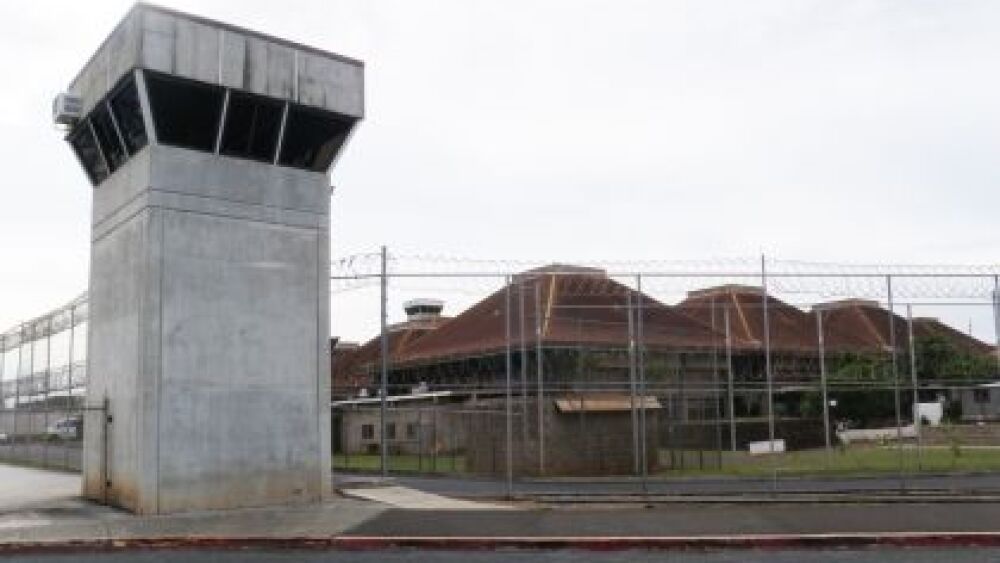By Peter Boylan
The Honolulu Star-Advertiser
HONOLULU, Hawaii — In a decision that divided county and state attorneys and left inmate advocates angry, the Hawaii Supreme Court ruled 4-1 to end judicial oversight of the state Corrections Division’s management of COVID-19 safety measures in Hawaii jails and prisons, arguing that the number of positive cases among the incarcerated population declined significantly since the court intervened in August.
The order also lifts the prohibition on judges imposing bail on defendants accused of certain low-level offenses during the pandemic, which permitted defendants to remain free while awaiting trial.
“According to recent filings in this case, it appears that the rate of positive cases in Hawai ‘i’s correctional centers and facilities has significantly declined since the petition was filed in August 2020, testing and other health and safety measures have been implemented within the correctional centers and facilities, and a vaccination program to vaccinate inmates is underway, " the justices wrote. “Thus, it appears that the conditions that necessitated swift action by this court in August 2020 are no longer prevalent. Conclusion of this proceeding is therefore appropriate.”
Chief Justice Mark E. Recktenwald, Justice Paula A. Nakayama, Sabrina S. McKenna and Chief Judge Lisa M. Ginoza ruled to end the court’s oversight, with Justice Michael D. Wilson dissenting.
“To protect judges from the lethal threat posed by inmates who have contracted COVID-19, the Majority exercised emergency jurisdiction to suspend the rights of all inmates to appear in court pursuant to Rules 5 and 10 of the Hawai ‘i Rules of Penal Procedure, " wrote Wilson in his dissent. “The incarcerated people of Hawai ‘i are a more vulnerable population. They are captive. They deserve no less protection from the lethal threat of COVID-19 during the pandemic emergency. Emergency jurisdiction should be maintained by this court until the emergency ends or expert testimony establishes that reasonable measures—including reduction of the inmate population to design capacity—have been implemented to protect the incarcerated men and women of Hawai ‘i from cruel and unusual conditions.”
On Aug. 31 there were 289 positive cases at Oahu Community Correctional Center and one positive case at Ha lawa Correctional Facility. As of Friday there were no active cases within state facilities or at the Saguaro Correctional Center in Eloy, Ariz., where the state has a contract to house Hawaii prisoners.
“All the credit goes to the hard-working, dedicated health care and facility staff who worked tirelessly long hours, following the pandemic plan to medically isolate, quarantine, and cohort inmates, and ultimately clear the facilities of the virus, " said Toni Schwartz, DPS’ public information officer. “Our facilities have been burdened by the extreme overcrowding for decades, and now added to that are the unique challenges posed by the COVID pandemic. The Public Safety Department has a mandate to ensure the health and safety of all inmates in custody and will continue to follow the pandemic plan to mitigate spread of the virus within the facilities.”
As of April 5, 1, 825 inmates in state facilities received at least one dose of the COVID-19 vaccine, which accounted for about 61 % of the state’s 2, 953 prisoners.
Wookie Kim, legal director for ACLU Hawaii, told the Honolulu Star-Advertiser his organization disagrees with the justices’ order to end oversight. The return to pre-pandemic bail practices will pack Hawaii’s already overcrowded jails and increase the risk of clusters of infections and outbreaks among inmates and the community.
Last week the ACLU filed a friend-of-the-court brief urging the justices to prolong oversight.
“We are extremely disappointed with the supreme court’s decision, " said Kim. “Everything feels the same, looks the same, is the same (in Hawaii prisons and jails ). So for the court to say these emergency conditions are no longer prevalent is shocking to read.”
Honolulu Prosecuting Attorney Steven S. Alm issued a statement lauding the justices’ decision to rule on his office’s motion to end the oversight, especially the section which permitted low-level offenders to remain free before their day in court. He said the ruling was the culmination of a motion filed by his office amid the repeated release of a man who allegedly went on a sexual assault spree in downtown Honolulu in March.
“While we are very concerned about the safety of inmates in our correctional facilities, we are also concerned about the safety of the public, which is why we filed our motion and are pleased with the Court’s actions today, " said Alm in a statement. “And although the Court’s order gives judges the discretion to set bail or keep certain defendants in custody, we do not intend to seek this for every defendant. Our focus will be on keeping those who are truly violent and dangerous, as well as those who repeatedly commit theft, in custody pending trial so that the public is protected.”
The state Corrections Division should continue its safety measures and educate inmates reluctant to receive the vaccine about the benefits to themselves and the community if they choose accept it, he said.
State Public Defender James S. Tabe told the Star-Advertiser his office is disappointed with the Supreme Court’s order. He said the Judiciary and public should remain vigilant to the threat posed by jail and prison overcrowding during a global pandemic.
“We believe, along with the U.S. Centers for Disease Control and Prevention, that the COVID-19 variants continue to pose a real and potentially fatal threat of the coronavirus in our already overcrowded jails and prisons, " said Tanabe. “The risk of transmission amongst inmates, jail staff, and the surrounding populations should have been reason enough to have continued the August 27, 2020 order.”
___
(c)2021 The Honolulu Star-Advertiser












